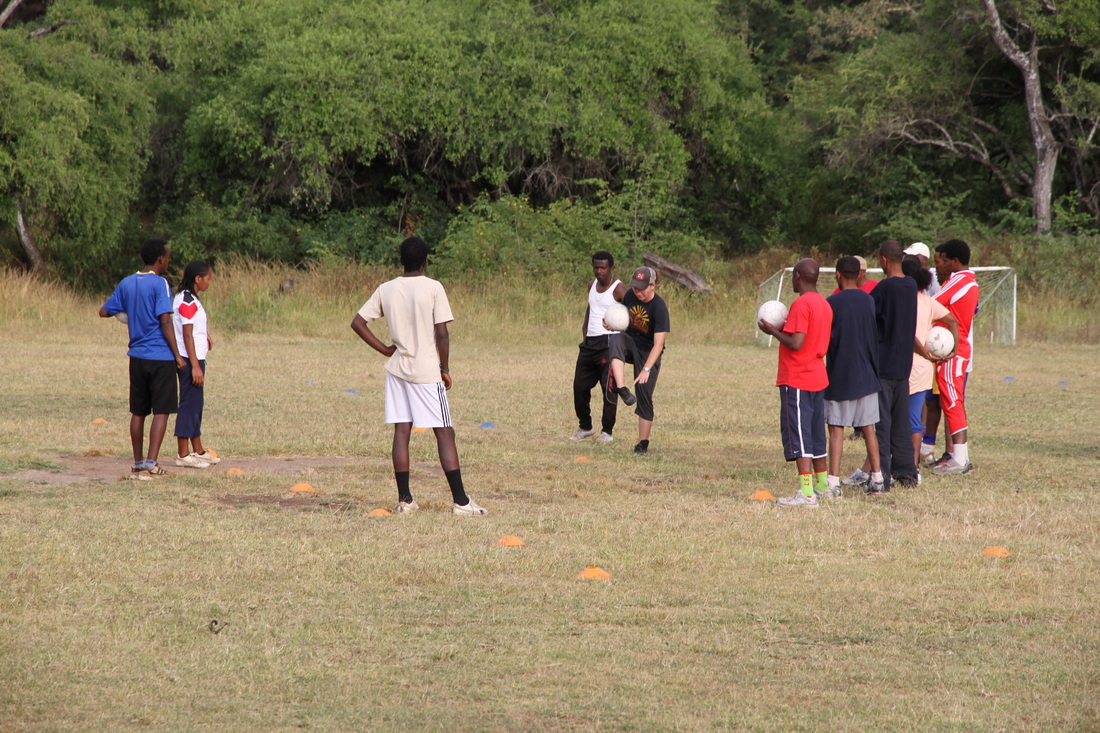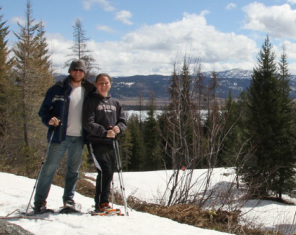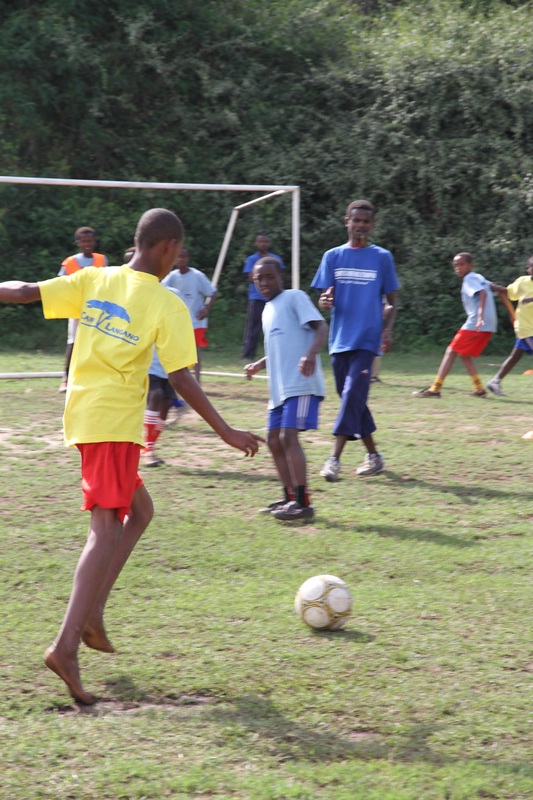So we were faced with a challenge here in Ethiopia, how to celebrate Thanksgiving without the traditions and supplies for those traditions we had in the US. Many traditional Thanksgiving Day foods are not available here, or are prohibitively expensive! But, have no fear, we are engineers – we didn’t go through 4 years of school for nothing! Our problem solving skills were tested this year and after analyzing the data, the solution was more than satisfactory. Don’t take our word for it, check out the photographic evidence below.
Problem #1: Lack of oven and stove space
Solution #1: Bring an oven to the Thanksgiving Day dinner!!! We call it, BYOO (Bring Your Own Oven). Since many ovens in Ethiopia do not fit 9x13 pans, it is essential to bring your own oven so that all of the food will be ready at the same time.
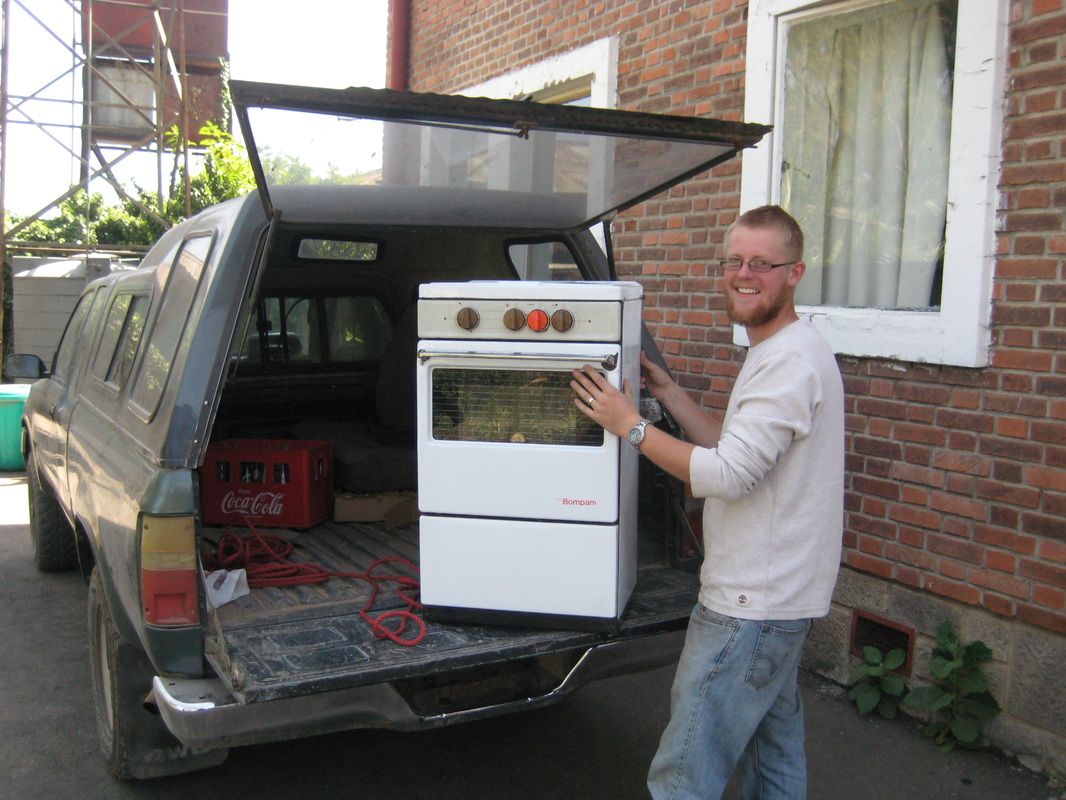
Bryan unloading the oven! :)
Problem #2: Lack of proper “Thanksgiving Day” food ingredients
Solution #2: Make chicken taste like turkey! Also, have your friends send you gravy packets and Jiffy cornbread mix for corn puddin. Finally, always remember to coat everything in butter!

The thanksgiving day spread!
Problem #3: Proximity to loved one
Solution #3: While being away from friends and family is very difficult, we praise God for a great team that loves each other.
We are so incredibly thankful for the opportunity to serve along side our Ethiopian & Ferenji brothers & sisters. Thank you for all of the love, prayers and support. We love and miss you all!!!
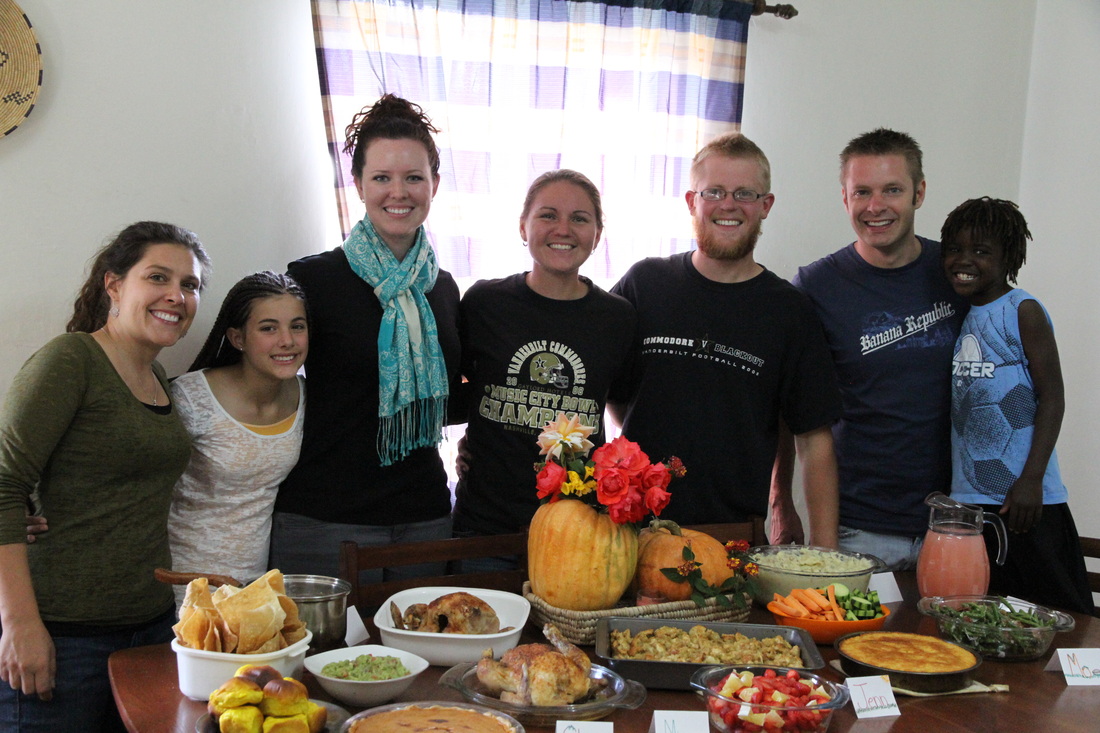
Enjoying a thanksgiving meal with our teammates
After seeing a birth, I now have a new appreciation for the resilience and strength babies possess. I wish I could interview a baby right before it makes the plunge into the real world, would they be scared, excited, or apprehensive? Would they have any idea of what awaits them on the other side of the birth canal? I suppose birth is our first experience with culture shock – new foods, sounds, smells and sights. In the womb life was safe. You had no fears or concerns about people endlessly kissing your cheeks, poking your eyes, or talking to you in a ridiculous baby voice. No wonder babies can scream/cry for hours on end - culture shock can be unbearable at times.
At times I have felt like a baby struggling to find my way in a strange new world. A world where weird smells waft through the air, people are unashamed to stare at me, and nearly every conversation is in a language I don’t understand and the words I can understand like “Ferenji” or “Give me ze money” only point out the fact that I am from a different world every time I step on the street. I live in a society where I rarely understand the social rules or structure, where productivity is redefined, and where simple tasks take an extraordinary amount of time. As I continue to wrestle through infancy, I am constantly reminded of the Ethiopian proverb, “Cus bu cus incolaloo bu igor yeheed” or translated to “Step by step the egg will start to walk.”
Last week we started studying Amharic at language school in Addis Ababa. We couldn’t have been more than 10 minutes into the first day when my Amharic instructor confirmed my musings by declaring every student in the room a baby! At one point he looked me in the eye, grinned and exclaimed, “You are a baby!” While the news only confirmed my suspicions, I found myself being both humbled and comforted.
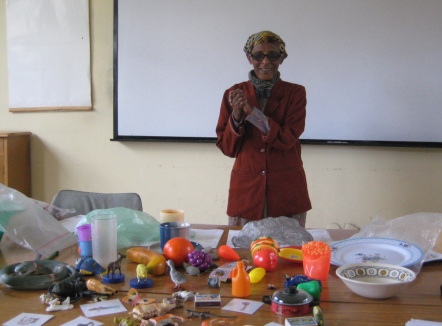 My instructor, Yissema, reviewing vocabulary You see, our language school teaches its students through the Growing Participator Approach as developed by Greg Thomson. This language learning approach is modelled after the way a child would learn their first or native language. Babies don't start out by talking or discussing grammatical sentence structures, they start out by listening to others speak. Then after a period of time, the child is able to start 'babbling' and then learns to put together proper sentences. So that is how our school is structured. At first being called a baby and not being able to speak was difficult, but the amount of vocabulary I have been able to retain and commands I am able to follow after 7 days is amazing. You should see the smile that spread across my face when I correctly followed the commands, "Find the donkey, pick it up, get up, walk to the door, open the door, go outside and put the horse under the chair, then come back inside!" I was so excited I broke out into a little cultural dance :)
By the grace of God our ability to communicate is improving every day. Our relationships with both Ethiopians and our "Ferenji" team are deepening as we rely on God's strength and mercy to get us through each day. May all the Lord receive all of the glory!!!  This is what Bryan looks like in class - I think his brain is full :)
Every day in Ethiopia brings new, exciting, and some times traumatizing things. This day happened to be a relatively quiet Friday. Since we (programming staff) worked 8 hours last Sunday, we decided to take Friday off. A day off typically means I do the dishes, laundry, and basically keep up with everything around the house that I have been neglecting. But this Friday brought a little more excitement. I have been discipling on Mia, one of the missionary kids on the compound. She is an awesome 12-year old with a huge heart and a great love for the Lord and people. Anyways, we had finished looking at Rahab's life (Joshua 2), eating candy corn, and decided to go help her mom fix dinner. At this point, I was thinking that my evening would consist of a nice dinner at the Smith's house and if things get crazy we might even play Settlers of Catan. Oh man - we did all of that and then some! :) Instead of helping with dinner we went down to the clinic to watch/help her mom with a delivery. It was about 5pm and the clinic was shutting down for the weekend, but a few people were still milling about. One lady from the community walked out of exam room and went to fetch her chicken from a nearby tree before she made the trek back home. Why she brought her chicken to the clinic I don't know, but the chicken was there...and then the chicken escaped!!! What started with one of the nurses
and the lady trying to catch the chicken turned into a 12-person chicken hunt. This chicken was ridiculously fast. And coincidentally, I was the one to scare it into taking flight. Once it was air borne, the laboratory tech came out of no-where, he flew through the air and snagged the squawking chicken! All of this took place about 3 feet from my head...so yes, I was screaming, which gave everyone watching & helping a good laugh. Once the chicken was securely placed back in the woman's bag, we went to check on the patient who was in labor. We walk into the 'in-patient room' - it is about an 8'x12' room with a bunk bed, two wooden chairs, a small cabinet and an exam table with stirrups in it. Lying on the lower bunk was a lady who looks like she is in her late 20's. This was her second baby and at the time there were no labor issues/complication, she just wanted to give birth in the clinic instead of her hut. I look around for all of the equipment I would expect to see in a 'hospital-like' delivery room. But the only equipment I found was a couple towels, a handheld heart beat locater, a couple of
buckets, and a 'delivery set' (clamps, scissors, snot sucker ball thing and a head lamp) - there are no IV's, no pain meds, no crushed ice, etc. Allyson (Mia's mom) is a FNP specializing in Labor and Delivery, she and an young Ethiopian male nurse, were going facilitate the delivery. The patient was about 5or 6 cm when I first got there. Her contractions were relatively frequent
and every time a contraction came, her fingers would latch onto the bed frame and small moans would slip from her mouth. At this point I started to become super uncomfortable. This lady was in labor and I was just standing there looking at her. I didn't know what to do with my hands, much less my eyes. So I decided my best bet was to smile and say hello. The woman spoke Oromyfia, so my attempts at conversation were pitiful. As I surveyed the room, I realized that I was the only one in the room who hadn’t witnessed a delivery before. I felt so awkward and out of place. Allyson guessed that she wouldn’t deliver for at least another hour, so we headed back to the house to finish making dinner before welcoming the baby into the world!
When we get back the patient was at about 8 cm, and I was still awkwardly standing in the room trying to figure out what to do with my eyes and hands. I started trying to figure out how I had gotten myself in this predicament. I realize that a 12-year old had talked me into putting a skirt on and 'seeing' if the baby had been delivered yet, next thing I knew I was a part of the delivery team, even though my role was just moral support! The nurse noticed my awkwardness, so he told me to sit in one of the chairs in the room. The only problem was that these chairs were literally at the foot of the bunk bed and thus the foot of the patient! Oh yeah, mild panic ran through my body. I had never seen a birth before and well, I usually prefer to stay on the ignorance is bliss side of things when it comes to actually birthing a small child!
Before I knew it, skilled hands caught the baby and eased the cord off her neck. Next thing I new, a scream was coming from the tiny baby. I’m still trying to figure out if I think it is beautiful or just strange that a human being is living inside a person and in a moment they are ushered into the world to breathe on their own, no longer physically connected to their mother. It is totally a miracle, but still think it is weird! :) Anyways, I got to help clean the baby up and put a new outfit on her.
We handed the baby to her relative and made it back to the house as the rest of the crew was finishing up dinner. Praise the Lord it was an easy labor and smooth delivery, but I don't think I want to see the 'messy/complicated’ ones – I’m traumatized enough!
As a senior in college I still hadn't quite figured out the secret to public speaking. Each semester I dreaded seeing the word "Presentation" in the class syllabus. The pure thought about standing up in front of a group, regardless of the size, terrified me. Throughout my undergraduate education, I received comments like "Prepare more", "You sway when you talk", and "Don't read from you notes" after every presentation I gave. But the thing was - I would spend hours upon hours preparing for a 3 minute presentation. Scripting, rehearsing, talking to myself in front of the mirror - nothing seemed to help. During my senior year I remember practicing in front of my roommates, trying different strategies to keep myself from swaying or stumbling over my words. They would laugh at me as I clenched my quads in attempt to keep my body from moving. Oh yeah - it was that bad.
That was almost 3 years ago. I recently helped lead a group of Compassion International coaches through the Sports Friends' Basic Training. We taught them everything from a Biblical foundation for sports ministry to how to run a training for kids. It was an amazing time of learning and growth, both for the participants and myself. Since moving to Ethiopia, I have had several opportunities to speak/teach about a variety of subjects related to sports ministry. While the thought of standing and presenting material to people still scares the dickens out of me, my mindset towards the task has significantly shifted. To have opportunity to equip believers with tools to aid in their ministry to youth is a huge honor and blessing. To be able to provide coaching tips and drills to a coach who has a heart for the lost but lacks the natural futball talent or knowledge to run a training is priceless. Often times this requires me standing up in front of a group, yet I know that despite my weaknesses and insecurities my God still chooses to use broken vessels to accomplish his will - what a comforting truth!
|





